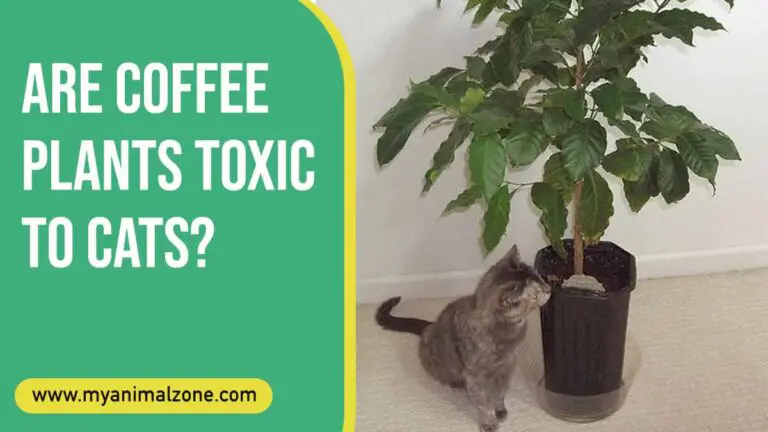Do you worry about whether or not coffee plants are toxic to cats? You’re not alone. Many cat owners wonder if their furry friends could get sick after eating a coffee plant.
As a pet owner, it’s normal to be concerned about your pet’s health, and when it comes to plants, a few plants can be harmful to pets.
Coffee plants are toxic to cats. All parts of the coffee tree, including coffee beans, leaves, small white flowers, stems, and brewed coffee, contain caffeine, a toxic chemical. Caffeine is a stimulant that can be dangerous to cats and other animals.
If your cat ingests coffee plant material, it may experience various health problems, including vomiting, diarrhea, abnormal heart rhythm, lethargy, and tremors, and in a high enough dosage, it can be fatal.
So, keep your pet cat away from coffee plants and caffeinated products, such as coffee grounds, tea bags, energy drinks, etc. Contact your veterinarian immediately if you suspect your cat has ingested coffee plant material.
Hopefully, you’ve got the answer to your question. Keep reading to learn a more detailed explanation of the symptoms of coffee tree poisoning in cats!
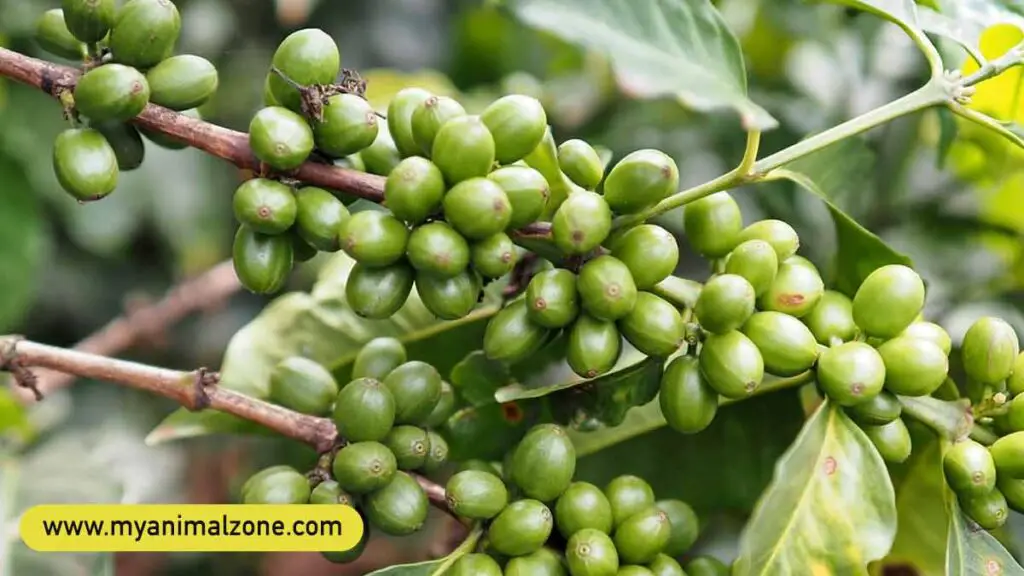
The Symptoms Of Coffee Tree Poisoning In Cats
Cats are curious creatures who enjoy exploring their surroundings, which includes chewing on plants.
Although most plants are harmless, some can be harmful if consumed. Coffee trees (Coffea sp.) are one of them. Pothos, peace lily and dieffenbachia plants are also poisonous to cats and dogs.
The following are symptoms of coffee tree poisoning that may appear in your pet cat if it ingests coffee tree material:
Contact Dermatitis
The most common symptom of coffee tree poisoning in cats is contact dermatitis (Atopic dermatitis), which is a reaction that occurs when the plant’s oils come into contact with the skin.
This can cause the skin to become red, inflamed, and itchy. In severe cases, the skin may blister or swell.
If your pet cat has chewed on coffee tree leaves, you may notice these symptoms on its lips, tongue, gums, or skin.
In addition, coffee trees can cause gastrointestinal (gastrointestinal tract) upset if ingested. It can include vomiting, diarrhea, and abdominal pain.
Loss of Appetite
Loss of appetite is another common symptom of coffee tree poisoning in cats. If your cat ingests a coffee plant, it may experience nausea and vomiting, leading to a loss of appetite.
Weakness
Another most common symptom of coffee tree poisoning in cats is weakness. It is often caused by dehydration from vomiting and diarrhea. If your cat ingests coffee tree leaves or coffee seeds, it can cause tremors, seizures, abnormal heart rhythms, or in severe cases, coma or death.
Caffeine Toxicity
If your cat ingests a large amount of coffee plant material, it may experience caffeine toxicity. Caffeine is a stimulant that can cause an increase in heart rate, blood pressure, and body temperature. It can also cause tremors, seizures, and in severe cases, death.
These are symptoms of coffee tree poisoning in cats. If you suspect your cat has ingested coffee tree leaves or you notice any of these signs in your pet cat, contact your veterinarian immediately.
They will likely recommend bringing your cat in for a physical examination and may also recommend blood and urine tests to check for dehydration and other health problems.
Can My Cat Drink Coffee?
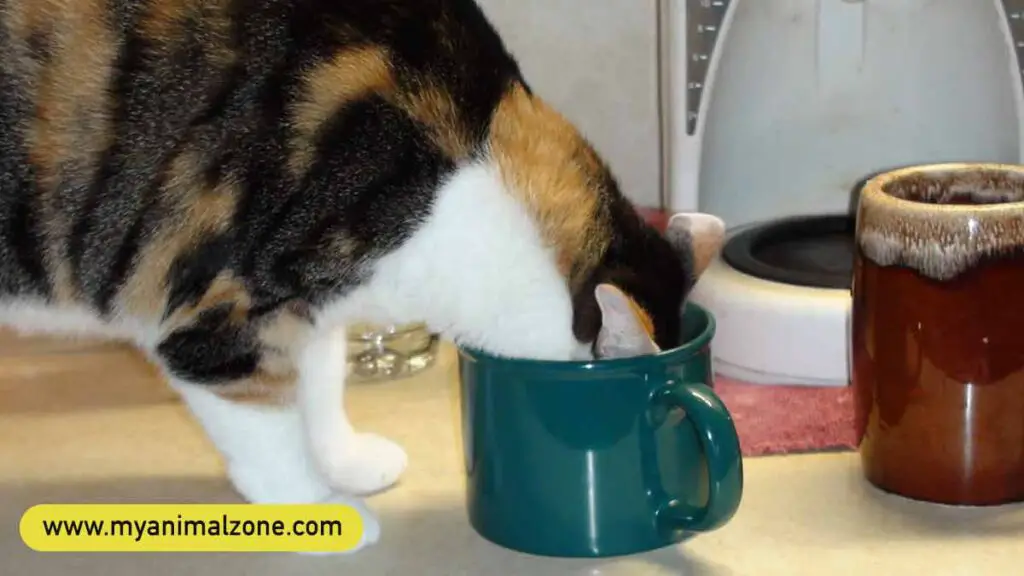
No, your cat shouldn’t drink coffee. Caffeine is highly harmful to cats and dogs because it contains methylxanthines. Methylxanthines can be found in chocolate, coffee, and some sodas.
Cats can’t metabolize it the same way we do. When pets ingest methylxanthines, they can develop several health problems, including vomiting, diarrhea, panting, restlessness, abnormal heart rhythms, etc. It can even be fatal if consumed in large quantities.
However, if your cat enjoys drinking coffee, it won’t harm him/her if it’s a minimal amount and only once.
The Pet Poison Helpline warns that a moderate amount of coffee can easily cause death in small dogs and cats. That’s why you shouldn’t include coffee in your cat’s diet.
Is The Arabica Coffee Plant Toxic To Animals?
Yes, every part of the Arabica coffee plant is toxic to all animals, including cats, dogs, horses, and birds. This coffee tree is also harmful to humans, except for the mature fruit (coffee bean). Coffea Arabica plants contain caffeine, an active ingredient in the plant that is toxic to animals.
If ingested in a small amount, it can cause vomiting and diarrhea. Consumed in large quantities can lead to an irregular heartbeat, seizure, and even death.
For this reason, keeping your animals away from Arabica coffee plants is vital. Be sure don’t grow these plants as large house plants in your house garden if you have a pet cat and other pets.
Can Cats Get Sick From Coffee Grounds?
Yes. Your cat can get sick from coffee grounds because they contain caffeine. Caffeine is harmful to cats and can upset your pet cat’s stomach, leading to vomiting, diarrhea, and tremors.
If ingested in large amounts, coffee grounds can also cause serious health problems or death as they contain toxins.
Because of this, it’s best to keep your cat away from coffee grounds and caffeinated products, such as coffee beans, energy drinks, etc.
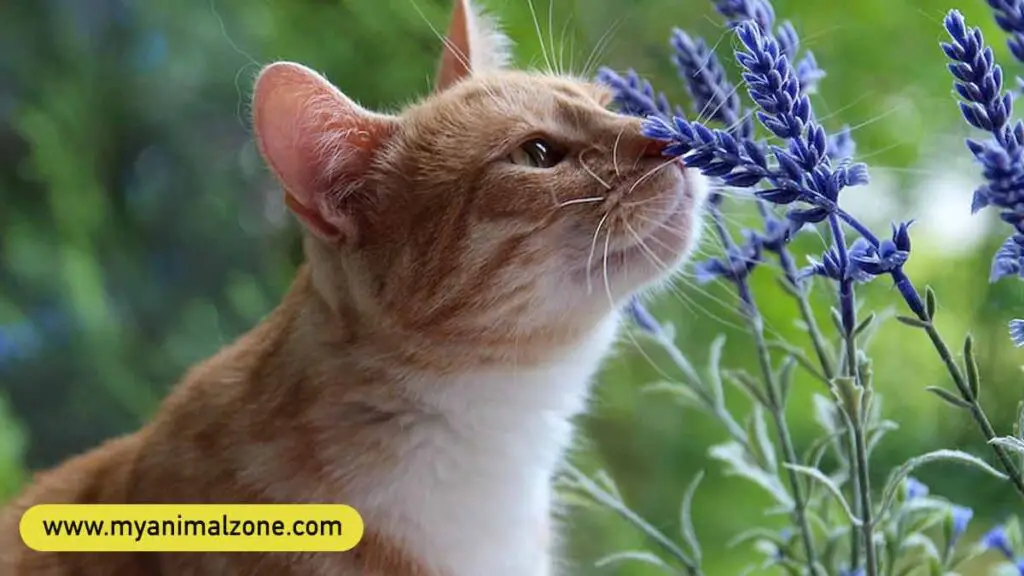
What Happens If A Cat Licks Coffee Grounds?
As I mentioned, if a cat or dog licks coffee grounds and may experience digestive upset, including vomiting and diarrhea. In addition, licking coffee grounds can also cause your cat to have tremors, an irregular heartbeat, and seizures.
If your pet cat ingests many coffee grounds, it can also experience liver damage, kidney failure, and even death.
Therefore, it’s best to keep your curious cats away from coffee grounds and any other caffeinated products. Contact your veterinarian immediately if you suspect your lovely pet cat has ingested coffee grounds.
What To Do If A Cat Ate A Coffee Plant?
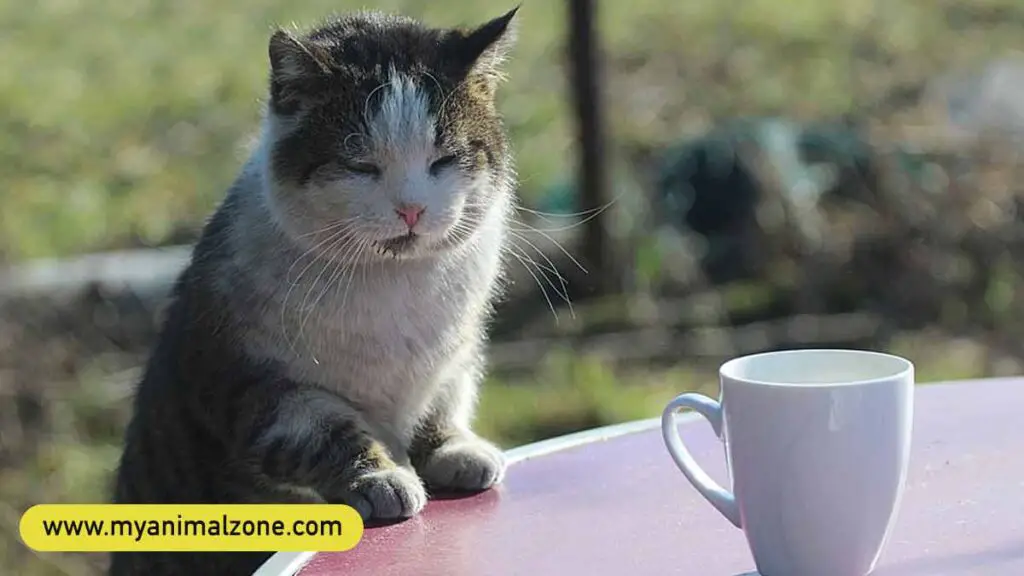
You should call your veterinarian if your cat has eaten a coffee plant. They will likely recommend bringing your cat in for a physical examination and may also recommend blood and urine tests to check for toxicity.
Your veterinarian may also recommend giving your cat activated charcoal to help bind the toxins in the coffee and prevent them from being absorbed into the bloodstream.
In severe cases, your cat may need to be hospitalized and given IV fluids and other treatments to help them recover.
Restlessness, rapid breathing, and an increased heart rate are symptoms of caffeine toxicity. Caffeine toxicity can cause death if it is not treated.
So, if your cat has eaten a coffee tree, don’t wait to call your veterinarian. The sooner you get treatment, the better the chance for a full recovery.
Final Words
Symptoms of caffeine toxicity in cats include vomiting, increased heart rate, restlessness, and tremors. In severe cases, caffeine toxicity can be life-threatening. Therefore, keep coffee material out of your pet cat’s diet.
Call your veterinarian immediately if your cat has eaten a coffee tree or ingested coffee grounds. Treatment will depend on the severity of your cat’s symptoms.
While coffee plants are toxic to cats, plenty of other plants are safe for your feline friend to enjoy.
Has your cat ever eaten a coffee tree or gotten into coffee grounds? If so, share your story of how you handled the situation in the comments below!

